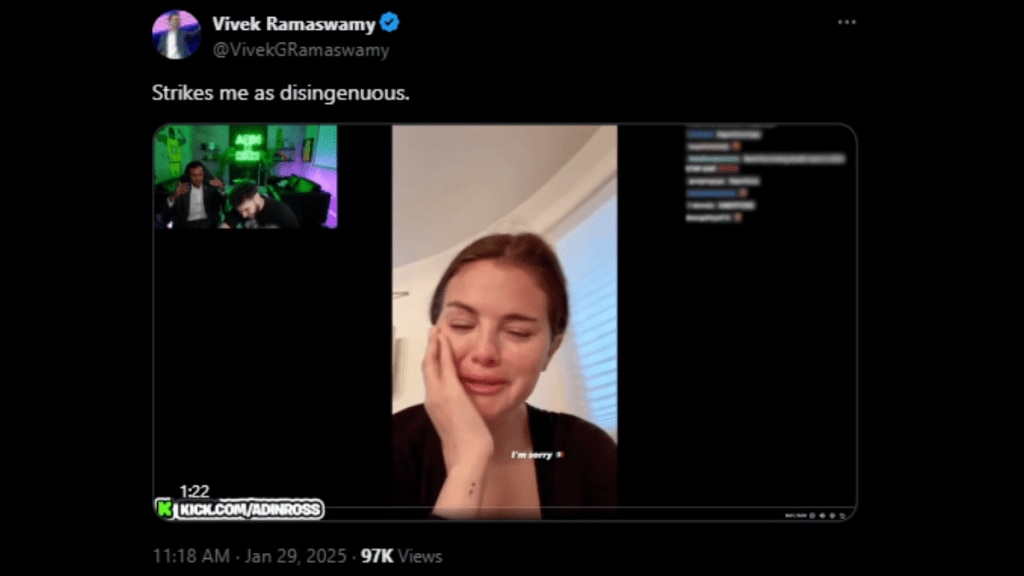In a recent podcast appearance with popular TikTok personality Adin Ross, Republican presidential candidate for 2024 US elections Vivek Ramaswamy shared his reaction to an emotional video of Selena Gomez crying over the deportation of Mexican immigrants under President Donald Trump’s administration. Ramaswamy posted a clip of the podcast on Twitter, writing that the video “strikes me as disingenuous.” He went on to comment that the emotional display “didn’t strike me as real” and that Gomez likely re-recorded and uploaded the video multiple times before sharing it.
The video, which was shared widely on social media, showed Ramaswamy asking Ross how old Gomez was, with the implication that her age could affect the authenticity of her emotional response. Ross estimated that Gomez was between 30 and 40 years old, which led Ramaswamy to further question the sincerity of the video. He explained, “It’s one thing to be self-to-camera, but I didn’t buy it.” Some have suggested that Ramaswamy’s frequent provocative remarks may stem from a desire to stay in the media spotlight, with his criticisms of others serving as a strategy to remain relevant and capture public attention.
Selena Gomez’s crying video
The video in question featured Gomez, dressed in a black outfit, recording a tearful message from her home, where she expressed deep sorrow for the plight of immigrants. “I just wanted to say that I’m so sorry. All my people are getting attacked. The children. I don’t understand. I’m so sorry, I wish I could do something but I can’t. I don’t know what to do. I’ll try everything, I promise,” she said in the now-deleted clip. Her tears were in response to the Trump administration’s decision to ramp up the deportation of Mexican and Central American immigrants.
Gomez’s tearful display of empathy for the children and families affected by the deportation policies quickly gained attention. Her emotional message resonated with many viewers who sympathised with the plight of immigrants, especially as it was seen as a personal expression of grief from someone whose own family has Mexican roots. However, the video was met with mixed reactions, with some viewers questioning whether it was an authentic response or just another example of a celebrity seeking attention.
Why did Selena Gomez delete the video?
The video was deleted shortly after it was posted, and Gomez later took to Instagram Stories to share a note, saying, “Apparently it’s not ok to show empathy for people.” The singer and actress, who has long been a vocal advocate for immigrant rights, has faced criticism for displaying emotion on a public platform. In addition to her social media post, Gomez produced the 2019 Netflix documentary Living Undocumented, which highlighted the struggles faced by undocumented immigrants in the U.S. under the Trump administration. The documentary followed the lives of eight undocumented families, shining a light on their emotional, psychological, and financial hardships.
Despite the emotional backlash from some critics, many of Gomez’s fans and advocates for immigrant rights supported her, defending her right to express her feelings. One user on Twitter commented, “She comes from Mexican immigrant parents. She was given an opportunity. We love you, Selena.”
The Deportation Crisis: Context behind Gomez’s tears
The deportation of immigrants has been a contentious issue throughout Donald Trump’s presidency, with the administration vowing to carry out the largest wave of deportations in U.S. history. In the first week after Trump returned to office, Mexican President Claudia Sheinbaum reported that around 4,000 migrants had been deported. Throughout 2024, more than 190,000 individuals were sent back to Mexico, according to government figures. The deportation policies have primarily impacted Central and South American migrants, many of whom have been subject to detention and separation from their families.
Gomez’s video was recorded as part of the wider reaction to these deportations, particularly affecting children and families. The policy has sparked outrage among many who view it as inhumane, especially as it disproportionately impacts vulnerable communities. Gomez’s outpouring of emotion was an attempt to voice solidarity with those who are suffering, though it was met with differing views on the sincerity of her response.
In the podcast, Ramaswamy appeared to downplay the emotional response to a serious political issue. While some agreed with his scepticism, others felt it was inappropriate to dismiss Gomez’s empathy, especially when it comes to a humanitarian crisis. As the conversation around the video continues, it raises important questions about the role of public figures in addressing social issues and whether emotional expressions can ever be truly authentic in a media-driven society.

